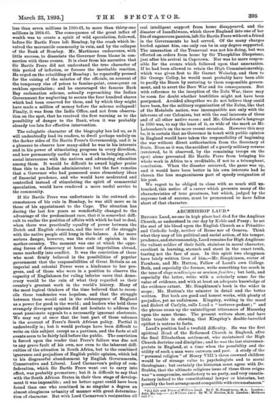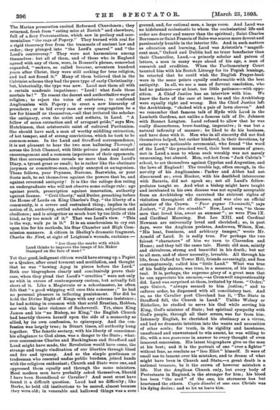ARCHBISHOP LAUD.*
BEFORE Land, no one in high place had died for the Anglican Church, as understood in our day by Keble and Pusey ; he set the seal of his blood upon the English Church as a Primitive and Catholic body, neither of Rome nor of Geneva. Think what they may of his political and social action, of his temper, prudence, and statesmanship, Laud remains for High Anglicans the valiant soldier of their faith, stainless in moral character, excellent in learning, staunch and stout in the exact truth, fearing not the face of man. In this spirit two clergymen have lately written lives of him,—Mr. Simpkinson, rector of Farnham, and Mr. Hutton, Fellow of Land's own College. Both, and especially the former, write something too much in the tone of eloge academique or oraison funebre ; but both, and especially the latter, write with a scholarly sense for the value of evidence, and with at least an adequate knowledge of the evidence extant. Mr. Simpkinson's book is the wider in scope ; Mr. Hutton's the minuter in detail and the better written. But both are good and honest works, with plenty of prejudice, yet no unfairness. Kingsley, writing in the mood and dialect of Carlyle, calls Laud a " torturer-pedant ; " and the phrase sums up the unintelligent utterances of Macaulay upon the same theme. The present writers show, and have little trouble in showing, that Kingsley's double-barrelled epithet is untrue to facts.
Laud's position had a twofold difficulty. He was the first spiritual Head of the Reformed Church in England, after the final Elizabethan settlement, who maintained the High Church doctrine and discipline ; and he was the last statesman. prelate in England, at a time when the possibility and the utility of such a man were outworn and past. A study of the "personal religion" of Henry VIII.'s three crowned children would be of strange value to psychologists and to moral theologians ; but certainly the historian must agree with Dr. Stubbs, that the ultimate religious issue of those three reigns was "a compromise, satisfactory to no party, and very unsatis- factory indeed to the constitutional lawyer or historian, but possibly the best arrangement compatible with circumstances."
• (1.) Life and Times of Wilimm Laud. By C H. Simpkint•on, M.A.. London John Mu. ) Without Laud. By W. H. Hutton, B.D. London: Methuen end C The Marian persecution excited Reformed Churchmen ; they returned, fresh from "eating mice at Zurich" and elsewhere, full of a fiery Protestantism, which saw in prelacy and cere- monialism "the rags of Popery." They burned with zeal for a rigid theocracy free from the trammels of ancient law and order; they plunged into "the Lord's quarrel" and "the Lord's controversy." They were not harmonious among themselves : but all of them, and of those who in England agreed with any of them, were, in Bossnet's phrase, somewhat expanded, "seekers, so called because, seventeen hundred years after Christ, they were still seeking for true religion, and had not found it." Many of them believed that in the Calvinist scheme they had the pure type of early Christianity : but, historically, the type was new. Laud met them all with a certain academic impatience: "Lord ! what fools these mortals be ! " To resent the decent and authoritative ways of religion ; to reject the voice of centuries ; to confound Anglicanism with Popery ; to erect a new hierarchy of preachers ; or to bid every man or every congregation be a law for himself or themselves,—all that irritated the scholar, the antiquary, even the artist and esthete, in Land. "A fellow of mean extraction and of arrogant pride," says Mrs. Hutchinson, that aristocratic saint of cultured Puritanism. She should have said, a man of worthy middling extraction, of hot temper, and of strong convictions, which he took to be common-sense. In the Laud and Strafford correspondence, it is not pleasant to hear the two men hallooing Thorough ! across the Irish Channel, with little private jests and mutual encouragement and a common impatience of their opponents. But that correspondence reveals no more than does Land's Diary, a tyrant great or small; he is rather like the obstinate juryman or committee-man, simply annoyed at antagonism. These fellows, your Prynnes, Burtons, Bastwicks, or your Scots mob, to set themselves against the powers that be, and against reverend antiquity ! It is like the college don rating an undergraduate who will not observe some college rule : age against youth, prescription against innovation, authority against license. "Civil liberty," said Butler, preaching before the House of Lords on King Charles's Day, "the liberty of a community, is a severe and restrained thing; implies in the notion of it, authority, settled subordinations, subjection and obedience; and is altogether as much hurt by too little of this kind, as by too much of it." That was Land's view. "This is the way, walk ye in it." It is an anachronism to cry out upon him for his methods, his Star Chamber and High Com- mission manners. A citizen in Shelley's dramatic fragment, Charles the First, at sight of Leighton's wounds, exclaims :— " Are these the marks with which Laud thinks to improve the image of his Maker Stamped on the face of man?"
Yet that good, indignant citizen would have strung up a Papist or a Quaker, after cruel torment and mutilation, and thought that he was "hewing Agag in pieces before the Lord." Both our biographers clearly and conclusively prove their case, when they plead that Laud's " cruelties " were not only no whit in excess of contemporary custom, but actually fell short of it. Like a Magistrate or a schoolmaster, he often felt that "a good whipping will cure this nonsense ; " he had no personal pleasure in inflicting punishment. Nor did he hold the Divine Right of Kings with any extreme insistence ; he had nothing in common with that acrid Erastian, Hobbes, nor with the later violence of Sacheverell. Yet, since King James and his "no Bishop, no King," the English Church had heartily thrown herself upon the side of a monarchy so allied, by its own confession, to episcopacy. And the con- fession was largely true; in Stuart times, all authority hung together. The fanatic sectary, with his liberty of conscience, his allegiance to God alone, was a danger to the State ; what- ever concessions Charles and Buckingham and Strafford and Land might have made, the Revolution would have come, the strange and tragic vindication of our liberties through blood and fire and tyranny. And so the simple gentleman or tradesman who resented undue public burdens, joined hands with the religions enthusiast ; Church and State were one, and oppressed them equally and through the same ministers. Most modern men have probably asked themselves, Should I have been Roundhead or Cavalier? And most must have found it a difficult question. Laud had no difficulty ; like Burke, he held old institutions to be sacred, almost because they were old ; in venerable and hallowed things was a sure ground, and, for rational men, a large room. And Laud was no hidebound ecclesiastic to whom the ecclesiastical life and order are dearer and nearer than the spiritual ; Saint Charles Borromeo or Saint Francis of Sales was scarce more devout and passionately humble in the interior life. And in such matters as education and learning, Land was Aristotle's "magnifi- cent man," Oxford and Dublin had no truer benefactor than their Chancellor, Land,—a princely scholar and patron of letters, a man in many ways ahead of his age, a man of research and erudition. When the Parliamentary Court taunted him with his Scotch Liturgy for its Popish leanings, he retorted that he could wish the English Prayer-book were in the same points equally conformable with the best antiquity. In all, we see a man of fervent resolution, who had no patience—or at least, too little patience—with oppo- sition. A Chief Justice has an interview with him. We know the facts of the case at issue; he and the Archbishop were equally right and wrong. But the Chief Justice left the Archbishop, "choked with a pair of lawn sleeves." And we remember that famous talk of Hyde with Laud in the Lambeth Gardens, not unlike a famous talk of Dr. Johnson with Bennet Langton. Laud refused to allow that he was really discourteous, brow-beating, imperative ; it was but a natural infirmity of manner; he liked to do his business, and have done with it. Men who in all sincerity did not find themselves helped, but rather hindered, in their devotions, by ornate or even noticeable ceremonial, who found "the word of the Lord," the preached word, their best means of grace, met in Laud a man to whom such worship was not merely unmeaning, but absurd. Men, red-hot from "Jack Calvin's" school, to set themselves against Cyprian and Augustine, and the laws of England ! The trouble lay, often enough, in the novelty of his Anglicanism : Parker and Abbot had not discoursed so ; even Hooker, with his deathbed intercourse with Saravia, did not speak so ; not all Land's fellow- prelates taught so. And what a bishop might have taught and inculcated in his own diocese was not equally acceptable from an Archbishop who exercised the strictest rights of visitation throughout all dioceses, and was also an official minister of the Crown. "Pour gagmer l'humanite," says Jonbert, "ii faut etre aimable." Now, Land was, "to those men that loved him, sweet as summer "; so were Pins lx. and Cardinal Manning. But Leo XIII. and Cardinal Newman are universally loved and cherished ; so, in past days, were the Anglican prelates, Andrewes, Wilson, Ken. "His heat, fussiness, and arbitrary temper," wrote Mr. Arnold of Laud. It is sadly true. For perhaps the two fairest "characters" of him we turn to Clarendon and Hume; and they tell the same tale. Heroic old man, saintly and chivalrous, strong and beautiful in his death; but not to all men, and of sheer necessity, loveable. All through his life, from Oxford to Tower Hill, friends caressingly, and foes contemptuously, called him "little Laud." What was true of his bodily stature, was true, in a measure, of his intellec- tual. It is, perhaps, the supreme glory of a great man that he can appreciate his enemies,—as Cromwell unquestionably did. Land was surprised at them, irritated by them. "Order," says Gnizot, "always seemed to him justice;" and to enforce order, he dispensed with all conciliatory tact. And so, as the Cavalier poet Cleveland has it, "The State in Strafford fell, the Church in Laud." Unlike Wolsey or Richelieu, he studied to serve his God while serving his King, God's minister of State; but spiritual sympathy with God's people, through all their errors, was far from him. Intensely English, he cherished his obstinacy as a virtue, and had no dramatic intuition into the wants and necessities of other souls ; for truth, in its rigidity and harshness, nnsoftened and unsweetened to win assent, he was willing to die, with a non, possumus in answer to every thought of even innocent concession. His latest biographers give us the man at his best; and it is the portrait of one "ever a fighter" without fear, as resolute as "lion Eliot" himself. It were of small use to lament over his mistakes, and to dream of what might have been in Church and State,—a great death is a national treasure, be it the crown of however mistaken a life. Not the Anglican Church only, but every body of Protestants in England, is the stronger for him ; his blood has been "the seed" of the one, his sternness has but heartened the others. Capio dissolvi et esse cum Christi) was his dying desire : and so let us leave him.







































 Previous page
Previous page